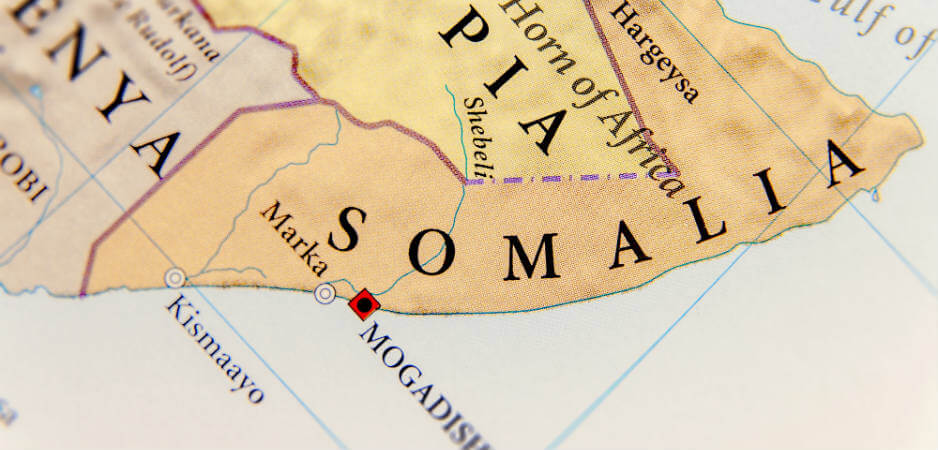To restore unity, Somali federal and state leaders need to cooperate and work together for the interest of the country as a whole.
The October 14 bombing that killed over 400 people, mostly civilians, near Mogadishu’s busy Zoppe Square was the single worst attack in East Africa since the armed insurgency erupted in Somalia in 2006. The harrowing attack became another agonizing testament to the country’s prolonged and ruthless conflict, the unresolved security vulnerabilities and the weak institutions of the Federal Government of Somalia. It was, also, a passing moment of national unity, as Somalis from all regions and walks of life rushed to aid recovering victims. That momentum of solidarity, however, was short-lived. Within days, infighting within government institutions was underway — business as usual.
In a country where 70% of the population is under 35, entire generations of Somalis have become accustomed to a nation without a government. When the state collapsed in 1991, two decades of lawlessness and conflict followed. Violence became commonplace, social relations were torn and the economy foundered. In 2012, at the end of a 12-year political process, the federal government was formed following the first election held in Somalia since 1969.
By 2017, the country’s first-ever bicameral federal parliament was formed. Then, at parliament’s first joint session in Mogadishu in February, Somali legislators elected a former prime minister, Mohamed Abdullahi Mohamed, also known as Farmajo, as the new president of Somalia.
It was the culmination of a long, arduous procedure. Observers noted that the electoral process was flawed, characterized by corruption allegations and vote buying. However, after Mohamed was declared victor, the widespread jubilation in Mogadishu and other cities surprised many. It was significantly indicative of the electoral outcome’s legitimacy and popular support and of the people’s aspirations for a better future under what many hoped to be a patriotic national leadership.
Mandate to Lead
The new government came to power with a strong mandate to lead; the nation had suffered for far too long, and it was time for change. The incoming government recognized the monumental task that lay ahead: restoring peace and national cohesion in Somalia, after decades of fragmentation. Still, the new government’s pronounced vision decidedly focused on fighting terrorism, corruption and poverty, yet it was not clear how that was to be done.
Like its predecessors, however, the government led by President Mohamed and the political newcomer, Prime Minister Hassan Ali Khaire, is struggling to regularly pay salaries, adequately manage the federal structure or contain disputes among the political class. This has ensured that the government remains distracted from working on federalization, economic recovery or the much-needed security and justice reforms.
 Even more troubling, the new administration seems to have followed the path of its predecessor, President Hassan Sheikh Mohamud. It wasted time and resources attempting to shape the state formation process through political manipulation and direct interference. In Jubaland, for example, such interference led to armed clashes in Kismayo in June 2013 and, in Galmudug, to the election of Abdikarim Hussein Guled, then-President Mohamud’s close associate.
Even more troubling, the new administration seems to have followed the path of its predecessor, President Hassan Sheikh Mohamud. It wasted time and resources attempting to shape the state formation process through political manipulation and direct interference. In Jubaland, for example, such interference led to armed clashes in Kismayo in June 2013 and, in Galmudug, to the election of Abdikarim Hussein Guled, then-President Mohamud’s close associate.
The Khaire administration should learn from mistakes of its former government. The outcome could be more political tensions exacerbating fragile conditions and derailing the country’s hard-earned political transition. To maintain public support, the administration will depend on whether or not the government enacts sound policies and corrective action without which it remains a weak, self-defeating and underperforming institution, dashing public hopes after election euphoria.
Neutrality in Regional Crisis
For generations, world and regional powers have vied for power and influence in Somalia due to the country’s strategic location connecting the Indian Ocean region, the Middle East and East Africa. With untapped natural resources, the country is a key regional security pillar and has great potential for investment and economic development.
In June 2017, when the Gulf crisis pitted a Saudi and UAE-led coalition against the state of Qatar, Somalia’s federal government announced its neutral position and called for regional dialogue to resolve the diplomatic crisis. The decision provoked regional states to contradict the federal government’s official position. State leaders argued they had a right to be consulted on major national decisions, and that the federal government violated the draft constitution by alienating regional voices. Needless to say, the regional states’ unilateral decisions bewildered the Somali public.
For the Somali government, the Gulf crisis was an opportunity to articulate its federalism strategy and foreign policy priorities. Such a strategy could help consolidate its domestic authority while augmenting its international stature. Instead, when Mogadishu unilaterally declared its position, it unwittingly instigated a domestic political row. Leading a fragmented and war-ravaged nation, the Somali government’s primary goal should be to build consensus around a national interest and recognition that such a feat requires the cooperation and input of the regional states.
Federalizing Somalia
Federal institutions and the regions have not agreed on a model to complete the federal system. The draft constitution is notorious for its vague stipulations, and both the federal government and the regions have misused the constitution to justify policies or frustrate the federalization process.
The constitutional review process has faced delays and is often associated with committees that work in secrecy. State governments have demanded a transparent constitutional process, which builds political trust and is vital to a fragile state rebuilding its democratic foundations. Particularly, roles and responsibilities between the Somali government, parliament and state governments in political negotiations remain undefined, often shrouded in controversy or locked in dispute. For example, will the prime minister and the state presidents negotiate directly, or will federal and state parliament subcommittees have an active role in federal-state negotiations?
Political friction between Mogadishu and the regions continues to be high, sabotaging the federalization process. Most recently, on October 10, five regional presidents issued a 16-point communiqué in Kismayo. Without any federal officials present, it was clear that the meeting was an effort to isolate the federal government. In late October 2017, President Mohamed invited the state presidents to Mogadishu for a week of talks. In theory, the two sides seem to have agreed on key principles. However, without a harmonized federal arrangement and an agreed model for power and resource sharing, similar deadlock cannot be prevented in the near future.
Cooperative Federalism
Article 54 of the draft constitution grants the federal government power in matters of foreign affairs, national defense, citizenship and immigration, and monetary policy. But the constitution envisions a form of cooperative federalism (as opposed to dual federalism) where power and institutional balance is harmonized between the center and the periphery. Such a system largely relies on consensus-building leaders at all levels of government.
The Somali government’s unilateral decision and lack of consultation with the states undermines that spirit of cooperation. The constitutional requirement of federal-state consultations forms the basis for preventing a return to the tyranny of centralized rule, while an incomplete federalization process, unaddressed community reconciliation and lagging security and political integration define the constitution’s realpolitik considerations.
Conversely, the regions’ contradicting the federal government’s Gulf crisis policy undermines national unity and reconciliation efforts. There are other political and institutional avenues whereby the states could express their dissenting voices, including through a federal parliament or judicial process.
Foundations of Security
Somalia’s complex security challenges cannot be addressed solely through police action and military offensives. The Somali government needs security cooperation and coordination with state governments, while ensuring tangible commitment to building the foundations of security: community reconciliation, equality under law and institutional and socioeconomic balance.
Facing the burden of geopolitics, the government’s decision to stay neutral in an international dispute was a positive move. But Somalia should benefit from its foreign policy decisions: think trade deals, investment and economic incentives. The government must balance between its foreign policy interests and local concerns. The practice of consultations and consensus building prior to making decisions affecting specific regional states’ economic interests will create trust and prevent future political crises.
Finally, there must be genuine political will — especially among the federal and state leaders — to cooperate and work together for the interest of the Somali nation. This is, perhaps, the most difficult task. It is also the only way Somalia can restore unity, confront security vulnerabilities and bolster national governance.
The views expressed in this article are the author’s own and do not necessarily reflect Fair Observer’s editorial policy.
Photo Credit: Bennian / Shutterstock.com
Support Fair Observer
We rely on your support for our independence, diversity and quality.
For more than 10 years, Fair Observer has been free, fair and independent. No billionaire owns us, no advertisers control us. We are a reader-supported nonprofit. Unlike many other publications, we keep our content free for readers regardless of where they live or whether they can afford to pay. We have no paywalls and no ads.
In the post-truth era of fake news, echo chambers and filter bubbles, we publish a plurality of perspectives from around the world. Anyone can publish with us, but everyone goes through a rigorous editorial process. So, you get fact-checked, well-reasoned content instead of noise.
We publish 2,500+ voices from 90+ countries. We also conduct education and training programs
on subjects ranging from digital media and journalism to writing and critical thinking. This
doesn’t come cheap. Servers, editors, trainers and web developers cost
money.
Please consider supporting us on a regular basis as a recurring donor or a
sustaining member.
Will you support FO’s journalism?
We rely on your support for our independence, diversity and quality.






